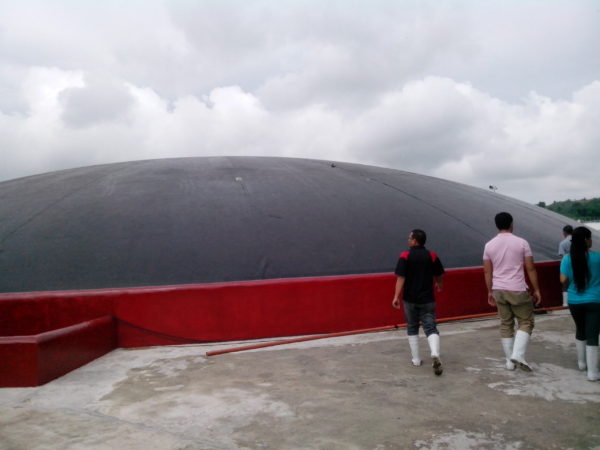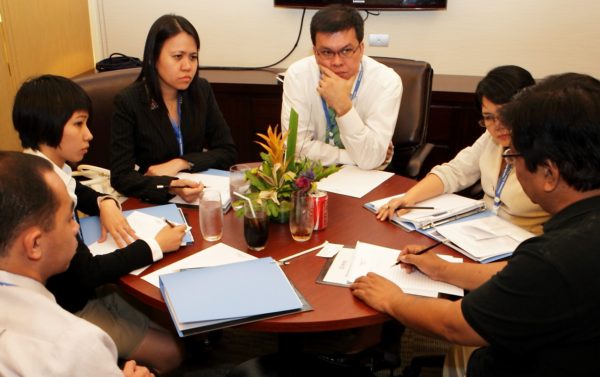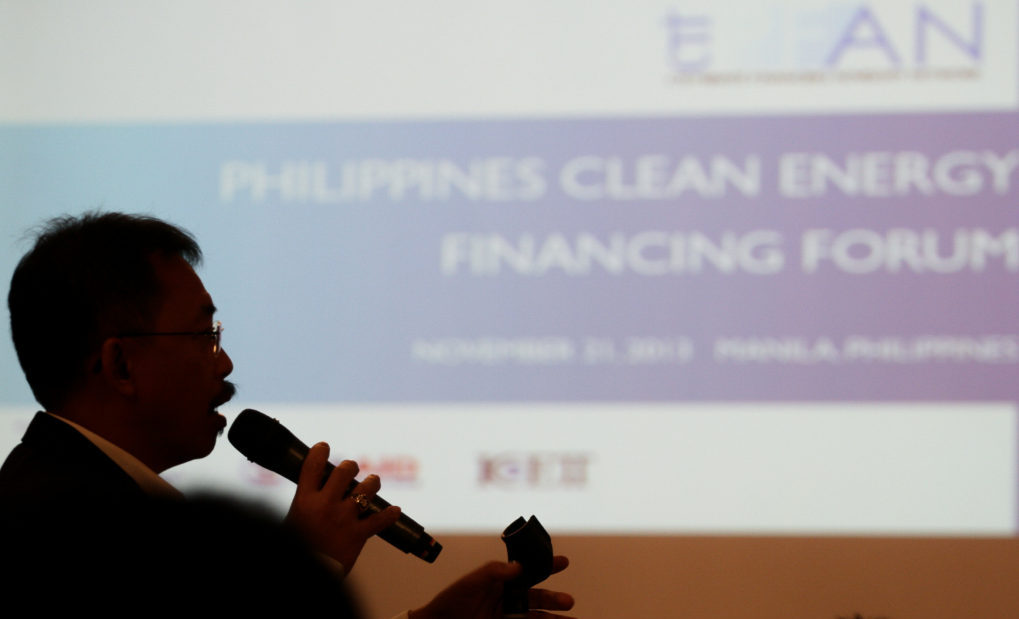Projects
Capacity Building
DREAMS Project-Institutional Strengthening and Mainstreaming for Iloilo LGU (UNDP-funded)
The objective of the Development for Renewable Energy Applications Mainstreaming and Market Sustainability (DREAMS) Project is to reduce GHG emissions through the promotion and facilitation of the commercialization of renewable energy (RE) markets and the removal of barriers to increase investments in RE-based power generation projects.
DREAMS project seeks to assist the Provincial Government of Iloilo (PGI) and local stakeholders including sample Local Government Units (LGUs) and Electric Cooperatives (ECs) to develop a provincial RE plan. CSi provides training and capacity building. The provincial RE plan aims to increase RE investments in Iloilo.
China-Philippines Technology Transfer Workshop on Biogas Technologies (UNIDO-funded)
This workshop focused on creating partnerships that can sustain South-South and Triangular Industrial Cooperation (SSTIC) that is envisioned to further contribute to industrial development and the economic growth of Southern countries through the promotion and transfer of new technologies from China. CSi led the design and conduct of the workshop to facilitate technology transfer on biogas from China to the Philippines for the development of small and medium-sized enterprises (SMEs). CSi prepared a scoping demand assessment to analyse current adoption of biogas technologies and identify sectors where there is high potential for technology uptake. The study served as input into the design of the workshop.
Capacity Building to Remove Barriers to Renewable Energy Development (CBRED) - Technical Assistance for Renewable Energy Engineering Service Industry Development (DOE/UNDP-GEF funded)
In this sub-contract CSi created a technical support program and a registration program for the development of the local Renewable Energy (RE) Engineering Service Industry. These programs seek to address the need to enhance local expertise and promote service providers who have proven capacities and capabilities in RE systems management which will, as a consequence, build stronger consumer confidence on RE systems and technologies and assure consumer protection.
Capacity Building to Remove Barriers to Renewable Energy Development (CBRED) - Technical Assistance to Manufacturers of RE Equipment (DOE/UNDP-GEF funded)
The objective of this sub-contract is to upgrade the quality and efficiency of locally manufactured renewable energy (RE) systems and equipment. CSi developed a program for local RE manufacturers that will enhance the technological capacity of local RE manufacturers to improve their products to a state that is responsive to customers’ needs and in the long-term be globally competitive. One of the primary components of the proposed program is a RE Product Certification Sub-Program where manufacturing processes and products of local RE manufacturers are audited to identify needs that must be addressed. An RE Technology Support and Development Sub-Program presents a selection of interventions that local RE manufacturers may tap into to address their gaps. Some of these interventions include assistance for enhancing their equipment capabilities, manpower development, and access to equipment design and project analysis software.
Capacity Building for Wind Project Developers, providers of Engineering Consulting Services and Government Planners on the Conduct of Preparatory Activities for the Development of Wind Power Projects in the Philippines and Vietnam, and Adopting European and International Standards (European Union Co-funded)
CSi was the lead implementer of this project which developed and conducted training modules for three (3) groups of stakeholders in the Philippines and Vietnam who play major roles in their country’s wind energy project development, namely: wind project developers/investors, providers of technical/engineering consulting services and government planners. The training program focused on the internationally-accepted processes for carrying out the different stages in wind power project development such as the initial identification of potential wind sites, pre-feasibility studies and securing financing. The project looked into the experiences of EU countries like Denmark and Germany, which have successfully implemented wind farm projects.
Capacity Building for Local Government Units (LGUs), Public Market Vendors and Households in Calaca, Batangas on the Sustainable Operation and Maintenance of a Biogas Facility Fuelled by Biodegradable Solid Wastes: Learning from European and ASEAN/Thai Best Practices (European Union Co-funded)
CSi led the team of implementers to build the capacity of the LGU, public market vendors, and households in six (6) poblacion barangays of Calaca municipality, province of Batangas, Philippines on biogas technology and responsible solid waste management. The project assisted the municipality of Calaca to partially comply with the Ecological Solid Waste Management Act of 2000 (RA 9003) by guiding the municipal solid waste management board in developing their 10-Year Solid Waste Management Plan. CSi conducted an assessment of the wastes generated by the six barangays to determine the viability of installing a biogas facility to provide power to the public market. The result of the study showed that with the current amount and kinds of wastes generated by the municipality, it is appropriate to go into composting of the biodegradable wastes for selling of the compost as fertilizer. However, in combination with the waste water of the alcohol distillery located in the municipality, the biogas power generation option becomes viable.
Beginners’ Training Course on Hydro Power Development (JICA-funded)
The objective of the training program was to provide basic knowledge on hydropower development to select employees of the Department of Energy and the Philippine National Oil Company who will be directly involved in hydropower development and implementation activities. CSi developed and conducted the 10-day training program specifically designed based on the results of a Training Needs Assessment performed on the target group.
Financing Energy Services for Small-Scale End-Users (UNDP-funded)
Also called FINESSE, the project’s main objective was to develop and strengthen the Development Bank of the Philippines’ (DBP) technical capability to evaluate and manage renewable energy projects for financing. The project focused on capacity-building as well as establishing institutional linkages with other players in the sector. Different sets of Lending Guidelines for the various RE technologies were developed. The Guidelines took into consideration the inherent characteristics and features of each technology. The Development Bank of the Philippines is presently one of the most active local financing institutions in the field of RE project lending. As a result of the in-house expertise that was built from FINESSE, it has been selected as the conduit of the World Bank Adaptable Program Loan that provides financing for projects in the RE sector.
Appreciation Seminar on Clean Development Mechanism (CDM) for the Development Bank of the Philippines’ Top Management
The intent of the seminar was to create understanding and awareness among the top executives of the Development Bank of the Philippines on the background and objectives of CDM and the opportunities available to the bank under this financing mechanism. As a result of the seminar, the DBP management recognized the opportunities CDM offers and pursued the creation of its CDM team that is now fully operational and actively exploring and pursuing opportunities to position the bank in the CDM arena.
Seminar on Clean Development Mechanism for Development Bank of the Philippines’ Area Management Office Heads and Senior Account Officers
CSi developed and conducted a 3-day seminar aimed to create awareness and improve understanding on the Clean Development Mechanism including the opportunities available under this new financing mechanism. There were 50 representatives from DBP’s head office and provincial braches who participated. Detailed discussion on the mechanics of pursuing CDM projects including the preparation of Project Design Documents (PDDs) was undertaken. Examples of projects worldwide that had reached closure in terms of selling their CERs were discussed and analyzed for the methodologies and assumptions used in their PDDs.
Appreciation Seminar on Clean Development Mechanism for the Department of Energy and Private Sector Representatives
The objective of the seminar was to create awareness and improve understanding of the Clean Development Mechanism among key officials of the Philippine Department of Energy and potential RE project developers and investors. The potential role of the DOE in the operation of the CDM Designated National Authority was discussed considering that renewable energy projects are potential candidates for CDM.
Capacity Building on Renewable Energy Technologies for the Land Bank of the Philippines (UNEP-funded)
Recognizing the need for innovative financing programs to help spur the commercial use of renewable energy sources in the Philippines, the United Nations Environmental Programme (UNEP) tapped the services of CSi to develop and conduct a 2-week seminar on the technical aspects of RE technologies for selected personnel of the Land Bank of the Philippines (LBP). The objective was to create awareness among the participants on the technical aspects of RE technologies and their potential for power / non-power application. CSi developed and conducted a technical training on selected renewable energy technologies particularly on its characteristics, operation and maintenance, and uses of commercially-ready RE systems and the status of development of emerging ones. This activity is in support of the bank’s interest to develop a lending facility for RE.
Project Design, Implementation & Management
ECO–Asia Clean Development and Climate Program (USAID-funded)
USAID initiated the ECO-Asia Clean Development and Climate Program covering China, India, Indonesia, Philippines, Thailand and Vietnam to promote policy and market transformation in Asia and encourage strategic investments in clean technologies in the region. Specifically, it will identify and promote activities that increase investment in clean technologies and lead to their expansion and scale-up. Based on a comprehensive regional analysis of clean energy priorities, the programme has identified three priority areas where it will focus its actions to achieve the following results:
- end-use efficiency, with focus on compact fluorescent lamps
- improved efficiency of coal power supply, and
- support to accelerate financing of clean energy projects/businesses through the Private Financing Advisory Network (PFAN).
CSi provides local experts support to implement ECO-Asia activities in the Philippines focused on PFAN which includes mentoring services to clean energy project developers and financing institutions aimed to bring clean energy projects to financial closure.
Market Service Center (MSC) Business Planning and Development, (DOE/UNDP-GEF funded)
The Market Service Center (MSC) is intended to be the focal point for RE market development in the country. The MSC’s core purpose is to be the catalyst for increased private sector investment in RE projects. It will be a one-stop-shop providing a wide range of services required by the RE industry from project development to implementation. Some of the services it will offer include: assistance in securing permits and licenses, provision of technical advisory and information services, and assistance in sourcing financing of projects. CSi developed the operational framework and prepared the documents required to formally establish the Market Service Center. This included identifying the most appropriate legal personality the MSC should take to allow it to attain its objective of providing services to the RE industry in a manner that will sustain its operation.
Development of CBRED Project Brief and Document for UNDP/GEF Funding (UNDP-funded)
The project aimed to produce the Project Brief and the corresponding Project Document (Prodoc) for the CBRED (Capacity Building to Remove Barriers to Renewable Energy Development in the Philippines) Project. CBRED is a 5-year program intended to carry out specific activities to address specific barriers related to policy, financing, marketing, institutional arrangements and promotions of RE technologies in the Philippines. The Prodoc is used by the funder as the basis for evaluating the merits of the proposal. CBRED Project was eventually approved for funding by the UNDP/GEF and was executed by the Department of Energy.
Preparation of Major Components of the Project Design Document (PDD) for Mini-hydro and Wind Projects
This subcontract aimed to prepare the major components of the PDD for two renewable energy projects of a local RESCO for application to the CDM. Specifically, the PDDs were intended for presentation during the road show in European countries led by the Philippine Department of Energy with the objective of attracting European investors to invest in RE projects in the Philippines. The potential CERs to be generated from the two (2) projects is the bottom-line of the marketing effort by the RESCO.
Preparation of Proposal for the Establishment of the Clean Development Mechanism – Designated National Authority (CDM-DNA) in the Philippines (UNDP/ GEF-Funded)
CSi prepared a detailed proposal on the establishment of the CDM Designated National Authority in the Philippines, including its operational framework as guide in the operation of the DNA. The legal options considered in the establishment of the DNA took into account current related efforts of the government on climate change and the expediency of tapping that option in order not to lose time in anticipation of the ratification of the Kyoto Protocol. The proposal was approved for funding by the Dutch Government through the UNDP and was the basis for the ToR for the follow-on activity, which is the establishment and operation of the CDM-DNA in the Philippines. The activities proposed had been implemented and the Designated National Authority is now fully operational.
Rural Electrification Institutional Strengthening (ADB-funded)
Working hand in hand with Snowy Mountain Engineering Corporation of Australia and local partner Sycip, Gorres and Velayo (SGV), CSi was involved in this ADB technical assistance (TA) project on rural electrification. The project’s primary objective was to improve and strengthen the institutional capabilities of the Philippine Department of Energy, its attached agencies, and the rural energy sector in general, in the planning, implementation, and evaluation of rural electrification programs with special focus on off-grid areas. The TA also aimed to develop procedures to enable integration of livelihood programs into the rural electrification project cycle to ensure sustainability of the projects.
Rural Energization
CleanEnergy Solutions International specializes in coming up with economically and environmentally sustainable solutions utilizing renewable energy technologies, their hybrids, or in combination with conventional technologies for producing electricity, heat, and mechanical energy for productive uses that enhance local livelihood, especially within the context of rural communities.
Our work in rural energization is premised on the concept that every project requires a unique approach, which is why we regard community-level consultation/participation and the active and continued involvement of capable and widely-accepted local partners (such as local government units, rural electric cooperatives, non-government organizations, and people’s organizations) in all project stages – from design to actual implementation and monitoring – as integral to overall sustainability and success.
Health Banks for the Poor: Redeem Your Health Goods (World Bank funded through the Development Marketplace)
CSi (then IRG-Philippines) was one of only 22 winners selected from 2,900 applicants to the 2007 Global Development Marketplace competition of the World Bank which is jointly funded by the Bill and Melinda Gates Foundation. This project is an innovative approach that addresses both health and environmental concerns of poor families in the island barangays of Binuangan and Salambao in the municipality of Obando, Bulacan province. The two barangays have the highest incidence of underweight children among the nine barangays of Obando. In addition, because of its geographical isolation from the mainland of Obando the two barangays do not have a waste disposal system in place. CSi established two Health Banks, one for each barangay, where families of underweight children may exchange their recyclable wastes for milk, vitamin supplements, and medicines for common illnesses.
Market Assessment
ASEAN Low Carbon Energy Programme
The Project identified interventions specific for various energy efficiency (EE) stakeholders such as the Department of Energy, ESCOs, and financing institutions. It aimed to encourage private and government sector to identify EE opportunities and pursue their implementation. The interventions identified included technical assistance and capacity building to be provided to government agencies and institutions involved in implementing the EE and Conservation Law as well as for the private ESCOs. CSi performed the following key tasks:
- Prepared market gap analysis for energy efficiency and proposed interventions for specific stakeholders.
- Prepared report on industry end-use consumption analysis and prioritization of sectors for intervention in the Philippines
- Conducted interviews with EE stakeholders (government agencies, private companies, financial institutions)
- Implementation of interventions particularly the implementation of the Energy Efficiency and Conservation Law
Distributed Energy (DE) Market Study for the Philippines (World Bank – IFC – funded)
CSi implemented the Distributed Energy Market Study for the Philippines that will serve as the foundation for IFC’s future efforts in the Philippine energy sector. The study goes to the root of the challenges and barriers in the use of DE in the Philippines and casts these against the pioneering success of selected DE companies, with the intention of understanding how these barriers were addressed and how more mainstream adoption can be achieved. CSi organized focus group discussions among relevant stakeholders (electric cooperatives, project developers, major customer groups, and government agencies) to understand their specific concerns and needs. An important component of the study is the analysis of the market mechanisms that enable DE adoption. Based on the resulting insights IFC can be more effective in catalysing collaboration between governments, energy companies, financing institutions and other ecosystem partners to push the wider adoption of DE.
Access to Sustainable Energy Programme in the Philippines: Technical Assistance for Access to Sustainable Energy on the Philippines Sub-Project
The Access to Sustainable Energy Programme (ASEP) supports the Philippine government in its efforts to offer solutions that will increase access to electricity, integrate renewable energy on- and off-grid, and promote energy efficiency. The sub-project is aimed at providing expert assistance to the Department of Energy and other stakeholders in appliance standards and labelling to enforce energy efficiency in the residential sector that is consistent with the Energy Efficiency and Conservation Roadmap and its Action Plan.
CSi provided the experts who reviewed the Philippine Energy Standards and Labelling Program (PESLP) and evaluated its coverage, general technical and particular product requirements (PPR) for select appliance standards and labels. CSi led the development of energy performance standards for prioritized appliances and presented these in public consultations among consumers, the Philippine Appliances Industry Association, and supply chain participants (manufacturers, importers, distributors, and retailers of appliances and lighting products). CSi also came up with recommendations on how to strengthen the institutional arrangements with the Bureau of Philippine Standards and Philippine Appliances Industry Association for the implementation of the appliance standards and labels.
Transfer and Deployment of Low Carbon Technologies in Southeast Asian Countries
The project is aimed at enhancing the capacity of government agencies of Indonesia, the Philippines, and Vietnam to access international climate funding for developing LCT projects by conducting a training course on bankable proposal writing. A five-day training program cover the development of low carbon project proposals for international funding agencies, including preliminary project design and planning, financial analysis, characteristics and key criteria of major funds, and other practical aspects of the proposal writing. The participants in the training program had the opportunity to be mentored by the experts to develop a real case proposal or a concept note. CSi supported the capacity building program by identifying and liaising with the participants.
CSi supported the identification and prioritization of low carbon technologies (LCTs) to mitigate GHG emissions in the Philippines. In parallel, CSi produced a report that reviewed the climate finance landscape of the country, summarizing existing government climate plans and programs, and mapping the local stakeholders involved in climate finance and actions.
Promotion and Deployment of Energy Efficient Air Conditioners (Funded by the International Copper Association)
CSi, in consultation with relevant government agencies, drafted the National Action Plan / Roadmap that will enable the Philippines to comply with the ASEAN MEPS (Minimum Energy Performance Standards) for room air conditioners (RACs) within the short term. The Roadmap identified specific activities to be undertaken by particular government agencies with their expressed commitment within an agreed timeframe. The Department of Energy is seen to take a lead role in the implementation of the Roadmap with the support of the Department of Trade and Industry – Bureau of Product Standards, the Department of Environment and Natural Resources-Energy Management Bureau and private sector stakeholders.
Baseline Market Study on Air Conditioner Use in Government Buildings
The survey was conducted to gather baseline information on air conditioners in preparation for a study on the technical and financial feasibility of shifting to more efficient aircons in government buildings. Aircon inventory questionnaires were sent to 120 government agencies. CSi performed the following key tasks:
- Collated survey responses, conducted site visits to selected government agencies to verify survey responses
- Analyzed and synthesized collected information
- Prepared survey report and presented in a dissemination workshop
Market Study on Copper-Intensive Technologies in the Philippines
The project aimed to understand the existing supply structure of the focus equipment: distribution transformers, power transformers, and power cables. It projected the demand for the focus equipment and identified their market drivers. The Project also determined the copper consumption in the supply side and the projected demand of copper from the focus equipment. The project also identified the use of other conductors among the focus equipment.
- Surveys among users and suppliers of the focus equipment
- Demand projections and market analysis
Scoping Study on Opportunities for High Efficiency Motors in Philippine Industries (World Bank-IFC-funded)
The scoping study on opportunities for high efficiency motors in Philippine industries was undertaken as part of the Sustainable Energy Finance Program (SEF) of the International Finance Corporation (IFC). This study identified local sustainable energy opportunities that will promote collaboration among commercial banks, industry players, energy management companies, and IFC. The study assessed the current status of electric motors in the Philippines, identified commercially viable energy efficiency projects, and identified the key barriers and challenges in the implementation and market penetration of high efficiency motors in Philippine industries. The study also assisted IFC’s local partner banks in identifying commercially viable projects on energy efficiency.
As project manager, CSi organized the timely implementation of project activities. CSi interviewed electrical/maintenance engineers and plant managers of several companies from different industries in the Philippines on their use of motors. CSi organized walkthrough audits of the installed motors in factories of selected industries with the local and international experts of the study team. Dissemination meetings with relevant government agencies and other stakeholders on energy efficiency in the country were also conducted. CSi also organized meetings with the local partner banks of IFC to assess their needs and criteria for energy efficiency projects. CSi assisted the study team in preparing the financial analysis tool that the partner banks can use to assess the viability of energy efficiency projects on motors. CSi also developed a database of motors suppliers, service providers, and ESCOs to assist industries in their energy efficiency initiatives. CSi organized technical seminars to promote the use of high efficiency motors in industries.
Climate Change and Clean Energy Project (CEnergy) - Assessment of Wind Energy Contracting Round (USAID-funded)
CEnergy aims to provide long-term and short-term technical assistance in the promotion of increased share of renewable and clean energy in the country’s primary energy mix, full implementation of retail open access and competition, climate change mitigation policies and improvement of public understanding and support on energy issues. An activity of CEnergy that CSi implemented was the assessment of the wind energy development activities in the Philippines to gauge the impact on the targets specified in the Renewable Energy Policy Framework and how the incentives under the RE Law of 2008 have encouraged the participation of more players in the wind energy sector.
Expanded Market Study for Indonesia Sustainable Energy Finance Program (IFC-Indonesia)
The expanded market study aimed to provide a solid platform of market research to enable the IFC to understand fully the opportunities and obstacles to the development of commercially sustainable renewable energy projects in Indonesia. The project focused on the palm oil and rice mill sectors which were prioritized in a previous scoping study also conducted by CSi (The Detailed Scoping for Indonesia Sustainable Energy Finance Program). CSi identified ten (10) renewable energy projects with high potential for commercial feasibility and bankability. Project briefs were developed for each of the 10 projects which financial institutions may use as basis in performing their own due diligence. A GIS map was developed showing the potential energy generation capacities of palm oil and rice mills in Sumatra and Kalimantan superimposed with the PLN electricity grid and energy supply and demand profile in these areas.
The Detailed Scoping for Indonesia Sustainable Energy Finance Program (IFC-Indonesia)
The scoping study aimed to provide a solid platform of market research to enable the IFC to understand both qualitatively and quantitatively the financing barriers that impede the development of sustainable energy in Indonesia. This project aimed to maximize opportunities for replicability and substantially improve access to finance for commercially viable energy efficiency projects. CSi made an assessment of the technical, financial and institutional barriers faced by the palm oil and rice milling sectors in adopting sustainable energy/cleaner production technologies. Clean technology projects that have been adopted in the two selected industries were looked into and assessed the conditions that brought about such initiatives. Success stories were analyzed and the policy environment and roles of different stakeholders in promoting cleaner production were also examined.
Feasibility Studies & Business Plans
Pre-Investment Studies for Rural Off-Grid Electrification Project (World Bank-funded)
CSi was the lead local partner of the US consulting firm Alternative Energy Development (AED) Inc. for this project which prepared a pipeline of five market packages (non-electrified municipalities/provinces) for possible funding by the World Bank’s Adaptable Program Loan (APL). The APL will be on-lent by the Development Bank of the Philippines to private project developers and investors. Business and financing models for electrification of the market packages were developed for consideration by private investors who will take on the task of implementing the electrification projects. The risk-sharing mechanism between the private investors, the national government and the local government units was studied under different sets of assumptions in order to assess the financial feasibility of the projects. Project activities included the conduct of field visits and consultations with the community in order to study their energy use pattern, capacity and willingness to pay and interest to participate in the electrification project.
Facilitating Financing
Private Financing Advisory Network - Philippines (USAID-funded)
CTI PFAN Philippines built on the existing Southeast Asia and Philippines Network Infrastructure established under the ECO Asia Program.
CSi continues its role as the Country Coordinator for CTI PFAN’s activities in the Philippines. CSi sustains and builds on the activities of the ECO-Asia-initiated CTI PFAN, manages and organizes the local network operations, and coordinates with the global and regional networks. CSi conducted various business development workshops among different clean energy sectors to build the PFAN pipeline and facilitate investment closure. Annual local investment forum were organized to introduce mentored clean energy companies to equity investors, debt providers, and potential business partners and clients.
Renewable Energy Support Mechanisms for Bankable Projects (ASEAN Centre for Energy/GIZ-funded)
The study aimed to determine the decision criteria for RE investments in on-grid biomass and solar projects in Philippines, Indonesia, and Thailand. The study included a survey of successful and unsuccessful on-grid solar and biomass projects using a survey questionnaire. A report on the status of RE sector in the selected ASEAN countries, including policy and regulatory frameworks, financing schemes, and existing programmes on RE was included.
CSi conducted interviews with clean energy project developers and financing institutions to identify key decision criteria for investing in clean energy projects. CSi also analyzed results of the survey based on existing policies, regulatory measures, financing mechanisms and existing programmes on RE. A workshop with ASEAN-Renewable Energy Sub-Sector Network (RE-SSN) representatives to gather information across the ASEAN region was organized with the ASEAN Centre for Energy.
Increasing Access to Local Sources of Financing for Renewable Energy Investments and Design of Innovative Financing Instruments: Case Study in the Philippines, Exchanging Experiences with Thailand, and Applicability of European Approaches (European Union co-funded)
CSi was the lead implementer of this project, which aimed to increase access of renewable energy project investors to local sources of financing to encourage the development and use of renewable energy in the country. This was achieved by capacitating three local banks: the Land Bank of the Philippines, Equitable PCI Bank and First Metro Investment Corporation on renewable energy technologies, markets, economics, and energy policies linked to RE development and financing. CSi designed innovative financing instruments and a strategy to integrate RE lending in the three banks’ policies. Considering Thailand’s successful RE policies and programs and Europe’s vast experience in RE financing and development, the project looked at Thailand’s and Europe’s experiences in RE development and finance and picked-up approaches that may be adapted locally. The beneficiary banks had dialogues with their Thai and European counterparts and exchanged experiences in financing RE projects.
RE Initiatives Delivery and Financing Mechanisms (DOE/UNDP - GEF funded)
This CBRED sub-contract was intended to design the mechanics and work plan of three different funds namely, the Project Preparation Fund (PPF), Loan Guarantee Fund (LGF), and Micro Finance Fund (MFF). The PPF is intended to provide partial conditional loan for project preparation activities such as feasibility studies, engineering design and securing permits and licenses required in the implementation and operation of RE projects. The LGF provides partial loan guarantee based on a risk sharing mechanism. The MFF is intended to provide financing for small-scale RE projects in remote off-grid areas which lack access to traditional fund sources. CSi designed the purpose, scope and limitations, management and operating guideline of the three funds as well as assisted in the selection of the Fund and Program Managers. The three Funds have been made available to the RE sector since 2006.
Monitoring & Review
Alliance for Mindanao Off-Grid Renewable Energy (AMORE) – Development, Installation and Guidance in the Implementation of the Monitoring and Evaluation Framework for the AMORE Project, (USAID-funded)
The AMORE (Alliance for Mindanao Off-Grid Renewable Energy) project aims to electrify about 160 remote rural barangays in Muslim Mindanao, particularly in the provinces of Tawi-tawi, Sulu, Basilan, Zamboanga del Sur, Sultan Kudarat, and Maguindanao using the most appropriate RE technologies such as solar PV and micro-hydro systems. It aims to make a difference in the arena of rural electrification by employing a sustainable approach. Towards this direction, CSi developed and installed the Monitoring and Evaluation (M&E) Framework for AMORE. Trigger indices were established as system alarms for identifying potential problems and a regular system audit was put in place to evaluate the status of the project at given time intervals.
Alliance for Mindanao Off-Grid Renewable Energy (AMORE) - Development of Sustainability Framework for Rural Off-grid Renewable Energy Electrification Projects (USAID- funded)
The AMORE project aims to provide electricity to 160 barangays in the Autonomous Region of Muslim Mindanao (ARMM), using renewable energy (RE) technologies such as solar photovoltaic (PV) and micro-hydro systems. CSi developed a sustainability framework intended to be a guide for the development, planning, implementation and monitoring of rural electrification projects. It included strategies and approaches aimed to increase the probability of sustaining the operation of installed RE systems including criteria for prioritizing sites and client identification. Post-project assessment of similar projects completed during the last decade was conducted as input to the sustainability framework. The framework was aptly adjusted to fit the conditions at sites where AMORE already operates.
Capacity-Building to Remove Barriers to Renewable Energy Development (CBRED) in the Philippines Medium Term Renewable Energy Outlook in the Philippines(UNDP-funded)
The CBRED project aimed to identify activities that will address the different barriers to the widespread use of renewable energy technologies and systems in the Philippines. CSi developed a medium-term RE outlook in the Philippines and the framework for monitoring and evaluation of the GEF impacts in the country. It included a review of the current sources of financing for renewable energy projects, their terms and conditions and the specific activities that qualify for financing. This pointed to the gaps in available financing from project R&D to the ultimate stage of commercialization. A review of the existing work linkages among the different agencies involved in the development, promotion and commercialization of RE technologies and systems was made and a framework for effecting an inter-agency collaboration and resources sharing was developed.
A Case Study on the Socio-economic Impact, Technical Performance, and Sustainability of Solar PV installations in Selected Recipient Municipalities under the Municipal Solar Infrastructure Project (British Petroleum-funded)
In this project also called MSIP, CSi served as the local partner of the British firm Environmental Resource Management which was engaged by British Solution to make a case study to evaluate the status of sample communal PV installations that were put up under the MSIP project in the late 90’s. Primarily, the project aimed to evaluate the socio-economic impact and sustainability of solar PV installations in sample municipalities. The market delivery approach was evaluated for effectiveness and sustainability of the systems. The scheme for collecting sufficient operation and maintenance (O & M) funds was similarly looked into for its ability to sustain the O & M requirements of the installations in the long term.





